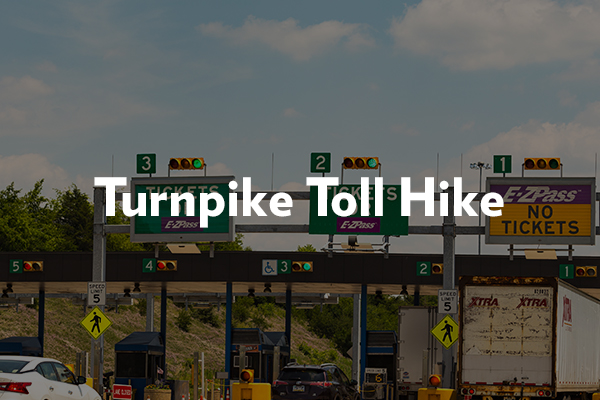Media

Turnpike Toll Hikes Highlight Missed Opportunities
There are three things Pennsylvanians have learned to count on: death, taxes, and Turnpike toll hikes.
On January 6th, the state toll road will increase rates by another 6 percent. Governor Wolf thinks that's a problem.
We agree. The chart below shows the unreasonable price increases Turnpike users are expected to pay.
(Infographic: Pa. Turnpike Toll Increases)
Back in 2008, CF supported leasing the Pennsylvania Turnpike, as proposed by Governor Ed Rendell, to net Pennsylvania $12.8 billion in upfront lease payments. It would also have capped toll increases (after a planned increase in 2008) to 2.5 percent per year.
Instead, lawmakers passed Act 44 of 2007 to “monetize” the Turnpike, requiring annual payments to the state funded by new debt (and backed initially by proposed tolls on I-80). When the I-80 tolling proposal failed to win federal approval, the Turnpike's payments were reduced from $900 million annually to $450 million annually. Act 89 of 2013 altered the plan. Now, all Turnpike payments help fund mass transit programs.
Turnpike drivers have been paying unsustainable toll hikes to fund mass transit systems they may never use. That’s the opposite of the “user fee” mindset of Turnpike tolls. In fact, that is the crux of a March lawsuit filed against the Turnpike Commission. Two national trucking companies are seeking $6 billion in refunds.
Maintaining our roadways is a core function of government, but those assets should be paid, as much as possible, directly by those who use them. User tolls and actual ride-cost fares on transit are just a few ways to tie funding to the beneficiaries of services rendered.
Revisiting a private lease today is unlikely to resolve the Turnpike's massive debt. However, there are other ways lawmakers and the governor can maximize current revenues to chip away at debt. Namely, repeal prevailing wage, require mass transit to engage in competitive contracting, reduce subsidies for those users who can pay their own way, and utilize public-private partnerships to bring private-sector capital and risk-sharing to fund our transportation needs.